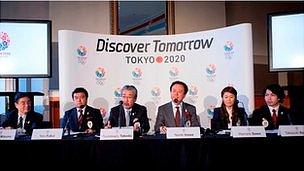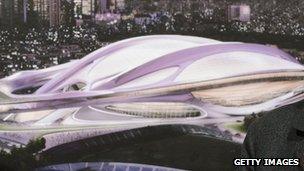Olympic Games bid offensive launched by Tokyo 2020 team
- Published

The Tokyo 2020 delegation launched its campaign at the St Pancras hotel in London
Tokyo has promised a well-funded, well-organised and safe games, should it be awarded the Olympics for 2020.
The Japanese capital is in competition with Istanbul and Madrid, with the International Olympic Committee (IOC) decision to be made this September.
A $4.5bn (£2.8bn) Tokyo government fund is in place ready for the vote result.
Tokyo hosted the 1964 games, but lost out to Rio for 2016. Looking at the previous bid, it says it aims to "keep the best and improve the rest".
A delegation was in London for the international launch of the Japanese city's campaign, having submitted its official candidature to the IOC in Lausanne on Monday.
They pointed out - under the bid slogan Discover Tomorrow - the advantages of the city's strong economy, low crime rate and extensive transport infrastructure.
A new 80,000-seat stadium is being built on the site of the 1964 stadium, and if the bid is successful, other new permanent and temporary venues will be constructed.
The new stadium will be given an advance run-out when Japan hosts the 2019 Rugby World Cup.
The Olympic Village would be built at Tokyo Bay and therefore situated within walking distance of the main venues, all of which would sit within an 8km (five-mile) radius.
There are also plans to "green" the city with more plants and trees.
'Shining example'
A recent general election in Japan saw former Prime Minister Shinzo Abe returned to power, but new sports minister Teru Fukui pledged in London that the new administration would "continue to give 2020 rock-solid backing".
Meanwhile, organisers dismissed fears around any long-lasting effects of the March 2011 Fukushima earthquake and tsunami and subsequent nuclear power plant leaks.
"The radiation levels are normal in Tokyo, they are the same as here in London," said Naoki Inose, governor of Tokyo,
He also pointed out that Tokyo was some 220km (136 miles) from the affected zone, in the north-east of the country.

Japan will host the Rugby World Cup in its new stadium one year before the 2020 Games
In the wake of the disaster, there were power shortages across the country, including Tokyo, but Mr Inose says new gas-powered power stations and underground energy storage facilities would be constructed before 2020.
Meanwhile, Tsunekazu Takeda, the bid committee's president, dismissed concerns that the Olympic community might not want another Games in east Asia, just two years after the Winter Olympics are held in Pyeongchang in neighbouring South Korea in 2018.
Mr Takeda pointed out that the 2012 Olympic Games were held in London and are being followed by a winter games in another European city, Sochi.
He also said that Tokyo, a city of some 13 million people, would "try to raise the bar" and look to follow London's example of leaving a legacy for both sport and the wider Japanese society.
"London 2012 was seen as a shining example of how to host, deliver and celebrate an Olympic Games. We learn from the success of London 2012 in the importance of stressing legacy at every stage of the bid."